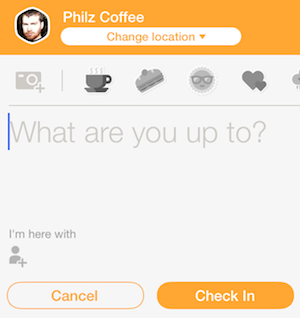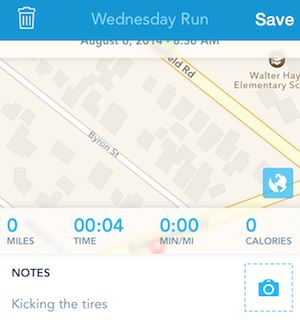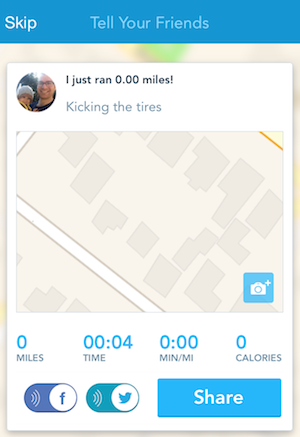The New New Foursquare
I think splitting up apps is probably a bad idea for most companies.
I just read two explanations as to why Foursquare split things up. I find this a bit odd, and there is almost certainly a model that works better in a single app.
For background, Foursquare built up an amazing amount of location data based on checkins. When they added background tracking, their sharing model needed to evolve because people don’t want to constantly share location, even with friends. So the new Foursquare has no checkins, just search and reviews. A separate app, Swarm, is about checking in and meeting up with friends.
I understand the privacy implications, but my running assumption is that they have turned a hard problem (privacy) into much more serious problems (usability and traction). They also have two apps to promote and distribute, which is incredibly confusing for users. They have upset their core fans in a way that doesn’t seem recoverable. The worst is that this whole configuration is too esoteric and confusing for most users to understand the motivation.
Here is my alternative:
Constant background location tracking is a signal of interest, but not shared on the network with friends or publicly.
Explicitly shared reviews become the primary sharing mechanism.
The same flow with an empty review is allowed when you’re at the location, and acts like a check-in.
Love something about a place? Add some notes, maybe a photo, and share it. Publish it to your friends on Foursquare, and then syndicate to Twitter and Facebook.
Want to share that you’re at a location? Don’t bother adding notes, just share an empty post. If you’re at a location, they default publishing flow should allow for no comments or photos. This is important because Foursquare has enough information to customize the sharing flow to allow for a basic checkin: if at location, allow empty notes as checkins. This feature is almost identical to the current check in feature.
Looking at screenshots from both apps makes this really obvious.
Walking through the app, we start with a location (this is the new foursquare):

When we want to share something about the place, we tap that compose button and get to this screen:

If the default were about sharing the location when you’re there, it could look something like this:

That is actually a different app, Swarm. The interfaces are almost identical, except that swarm has richer sharing details.
I’m reminded of another location app, Runkeeper. After a run, you’re asked how it went:

And then you’re asked to share, with incredibly obvious privacy controls:

Combining the best elements of background location, social sharing, unified tips + location sharing, Foursquare could continue with a single app.
This could be even better with foursquare because you could make the default to share with connected networks like Twitter and Facebook. This means it could probably fit in a single screen with syndication as a default.
I’d love to hear from Foursquare folks why this wouldn’t work. I should add that the primary use case of Foursquare being search works great for me. I love it. This whole post is just trying to put a “check in” back into a single app.
I’m reminded of Twitter here too. Twitter has both favorites and retweets. Favorites share tweets into your friends’ “discover” tab. Retweets share tweets into your friends’ timeline. A simpler configuration would be a single action (favorite), and a algorithmic feed which broke strict chronology. As it is, chronology is already broken with retweets and reply conversations, but controlled by users and not an algorithm designed to give me the best experience.
Why have such incongruous features? Because of product momentum. If you’re someone that builds products, you should pull out your machete and hack away such emotional baggage. Your users will thank you… eventually.
EDIT: Foursquare cofounder Dennis Crowley answered a bunch of questions on this Product Hunt thread about the new foursquare.
His point in that thread is that coordinating with friends is a different privacy model than one you might expect when leaving a review. Friends vs Followers. Interestingly enough, it doesn’t appear the VCs that blogged about this issue quite understand it, focusing on constant location tracking which isn’t relevant.
But let’s talk about this issue. There are a few features we want to support here:
- Review a place
- Tell friends where you are
- Tell everyone where you are
- Coordinate with friends to meet up
If I were to make this work, I think I agree you’d need to get around the privacy model of public followers and private friends. I would do so by ditching the idea of public followers, which don’t really make sense to begin with. Have a mutual friending model that then exposes access to a thread around each note/checkin.
So from the list, this would support 1, 2, and 4, but cut 3. You could get an activity feed, or tied to a map, of your friend’s activity. You could ping a friend about some activity in a comment thread. You could add other people to the thread to expand the conversation. If I understand it, this comment thread would cover the reason why Swarm exists.
This would allow users to feel comfortable that notes they leave about locations are public and shared, but all conversations with friends around sharing location are private among friends of the publisher. Note that this will be obvious to the user because they will know everyone leaving a comment. If you’re not constantly updating location publicly, I think this permissions model could even be a bit looser (e.g. maybe I know when my friend commented about a not-my-friend’s status).
If you want to be super safe around messaging, you could always just allow a user to send an SMS to a friend.
Let me be so bold as to make a prediction: Swarm will shut down within a year and they will either add such messaging or kill social coordination.